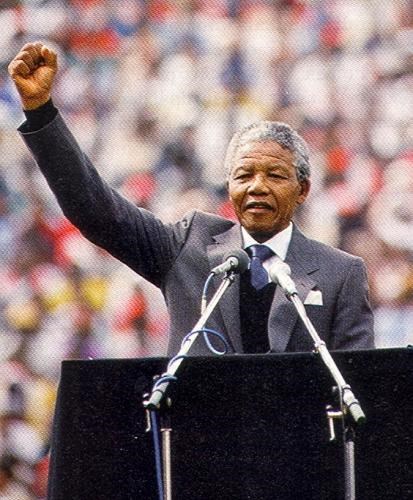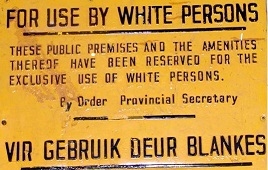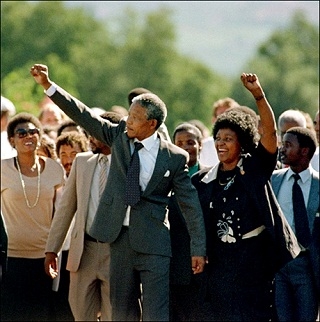 |
| Nelson Mandela giving a speech (http://www.blackpast.org/files/blackpast_images/Mandela__Nelson.jpg) |
“A great leader's courage to fulfill his vision comes from passion, not position.”(John Maxwell) Not only did Mandela have the position, but he had the passion. Nelson Mandela’s father, Rolihlahla Mandela was the chief and the leader of his people. Leadership runs through his family. As a little boy he watched his father be a leader. He soon followed to become one of the most influential peace-maker in the world. Nelson Rolihlahla Mandela was born into a royal family on July 18, 1918 in Umtata, a village in Transkei, South Africa. Like his father, the chief of Tembu people, Nelson became a leader of his people. Mandela lived a relatively easy life as a child in South Africa, until the elections of 1948. In 1948, the Afrikaners Party was elected to lead of South Africa. The Afrikaners Party later named National Party (NP) put apartheid into effect. South Africa divided up into racial/ ethnic groups: whites, blacks, and colors, instead of a united nation. The Apartheid act was the segregation or separation of blacks and colors from the “white race”. These racial laws effected social, political, and economical aspects of people’s lives. People were not allowed to marry someone of a different race, have certain jobs (considered to be “white” jobs), or even be in the same places as whites. Mandela joined an organization called the African National Congress (ANC), which aimed to end the inequality between races. In June 1961, the ANC was banned, but Mandela continued for his cause with an organization called the Umkhonto we Sizwe, meaning Spear of the Nation. From 1963 through 1990 Nelson Mandela had spent over 27 years in prison, having been arrested multiple times. When he was released in 1990 he resumed his work and became the president of the ANC. Years passed before the apartheid era ended on April 27, 1994. Nelson Mandela became the first democratic president of South Africa after apartheid. He retired from his position in 1999, but still continues work to solve global issues. While in his leadership position, he has accomplished many things, such as making South Africa a democratic country and ending apartheid. Although he achieved his main goal of reaching equality and freedom, his achievements did not cease. Mandela developed admirable qualities after all the hardships in that time. He later went on to become president of South Africa. Despite the fact that Mandela had multiple obstacles in the way of achieving his dream, he was patient, strong willed, and courageous. His determination has inspired others to strive for their dream even if it means taking a risk to succeed.
 |
| Apartheid sign (http://murraymcgregor.wordpress.com/chapter-14-the-birth-of-apartheid/) |
It took outstanding acts of courage for Nelson Mandela to reach his dream of freedom and equality for him and for his people. His courage helped him win the battle against apartheid. Mandela was prepared for the consequences of his actions, even if it meant separation from his family, pain and death. His courage primed him for the risks that were to be taken to ensure freedom. He said, “I have cherished the ideal of a democratic and free society in which all persons live together in harmony and with equal opportunities. It is an ideal which I hope to live for and to achieve. But if needs be, it is an ideal for which I am prepared to die.” Nelson Mandela risked his life for the freedom of others. He portrayed heroism by endangering himself and his loved ones to live in a democratic and united country. Mandela relied upon himself to lead the way to receive equal opportunities, freedom, and equal treatment. Despite the threats, terrorization, and intimidation from others, he sacrificed everything including his life and family out of passion for his people.
After the ANC was prohibited in 1961, Mandela led and participated in the Umkhonto we Sizwe. He equipped with knowledge and was prepared for violence and guerrilla warfare. “The government outlawed the ANC in 1960, but Mandela renewed the protests and went into hiding. In 1961, he became the commander-in-chief of Umkhonto we Sizwe (Spear of the Nation), an organization committed to an armed struggle against apartheid.” (Saunders) Mandela contributed to an organization that was banned for its cause and protest against apartheid. Although it was banned, he still protested for equality between races without fear. He jeopardized his life for the greater good of humanity by leading the ANC to fight. He demonstrated heroic acts of bravery to ensure the freedom of others even if it mean inflicting pain and suffering on himself. Mandela pushed for his dream by fighting for it, and successfully ended apartheid with courage. Nelson Mandela displayed valiant characteristics like courage to strive for the end of apartheid and the start of a democratic government. His courage got him through terror, threats, intimidation, and consequences from the risks he took to achieve: freedom, equality between races, and equal opportunities.
Patience and strength-of- will were portrayed as two of Mandela’s heroic traits. These traits helped Mandela move forward for a democratic government and a free country. As violence in South Africa rose, his compliance helped achieve nonracial governments. Mandela patiently waited 27 years in prison, and when released he became a leader of a flourishing organization. “Released unconditionally from prison on February 11, 1990, by the newly elected president F. W. de Klerk, Mandela immediately assumed the leadership of the ANC’s negotiations with the Nationalist Party government. Against a backdrop of rising violence, he showed repeated willingness to compromise with former opponents without abandoning the goal of nonracial constitutional democracy based on one person, one vote.” (Darity) Mandela’s strong will helped shaped who and what he is. Although he spent 27 years in jail, he continually pushed for a compromise for peace. He did not desert his purpose after being in jail; he resumed his work to negotiate unity and equality. Mandela displayed patience as one of his heroic traits by remaining calm and secure despite the hardships they had to go through. Even though Mandela had prostate cancer and inconsistent imprisonments for 27 years, he preserved the ability to fight for the end of a one-party government. Even though he received offers to be released as long as he did not protest the racial government, he didn’t accept. He rejected the offers due to patience. Mandela wanted to live in a democracy, even if it meant more time in jail. Using his patience, he helped push for equality. “At several times during his imprisonment the South African government tried to negotiate his release, but Mandela would not agree to the terms even though it meant staying in prison.” Mandela had not lost his patience for the change in government, quite the opposite, in fact; he refused to live in a racist government, despite the fact that he would have to wait and stay in jail for a longer period of time. Nelson Mandela rebuffed the concept of living in racist country and one-party, oppressive government. He strived for the idea of “one person, one vote.” (Mandela) The government deteriorated and the apartheid law ended as of 1990, due to his persuasion and pushing of his will. Nelson Mandela displayed heroic trait of patience and a strong will. His acts of patience aided in the end of a one-party, oppressive government and the beginning of a democracy. Mandela’s strong will influenced the concept of “one person, one vote” and equality between races.
 |
| Nelson Mandela as he became president of South Af (http://tyronevh.wordpress.com/2010/02/11/20-years-of-freedom-for-mandela/) |
Although Nelson Mandela was faced with many challenges in his life, he still has managed to get past the dilemmas. His patience, will to continue, and courage has inspired many to go after their dreams and more. His influence on the world has impacted how people take on the challenges, by taking a risk or doing more than they thought they could ever do. Mandela has got where he is today by having the will to continue what he starts. His heroic acts of courage put his life at risk for good of humanity. He patiently waited 27 years in jail to be released into a better South Africa. He had to deal with constant threats and accusations but he was capable of overcoming them. Not only did he give insight and advice but he acted upon what he believed in, instead of holding back due to fear and risks. Mandela is an inspiration to others because he did not stop after reaching his goal of freedom and equality; he kept going, becoming an influence on peacemaking for world issues. He showed that there is such a thing as a “dream come true”. This is what true heroes possess: the courage to fight even if there are consequences, don’t stop even after achieving, and wait for your outcome, not others’.
Mandela once said: "There is no easy walk to freedom anywhere, and many of us will have to pass through the valley of the shadow [of death] again and again before we reach the mountain tops of our desires.”
Works Cited
“Mandela, Nelson.” International Encyclopedia of the School Sciences. Ed. William A. Darity, Jr. 2nd ed. Vol. 4. Detroit: Macmillan Reference USA, 2008. 580-581. Gale Virtual reference Library. Web. 27 Mar. 2011.
Mandela, Nelson (1918-).” UXL biographies. Detroit: UXL, 2011. Student Resource Center- Gold. Gale. DEL NORTE HIGH SCHOOL. 30 Mar. 2011
Nelson Mandela Biography.” Nelson Mandela. Nelson Mandela Foundation, n.d. Web. 28 Mar 2011http://www.nelsonmandela.org/index.php/memory/views/biography/
Saunders, Christopher. “Mandela, Nelson.” World Book Advance. World Book, 2011. Web. 27 Mar. 2011
Page created on 4/25/2011 12:00:00 AM
Last edited 4/25/2011 12:00:00 AM
